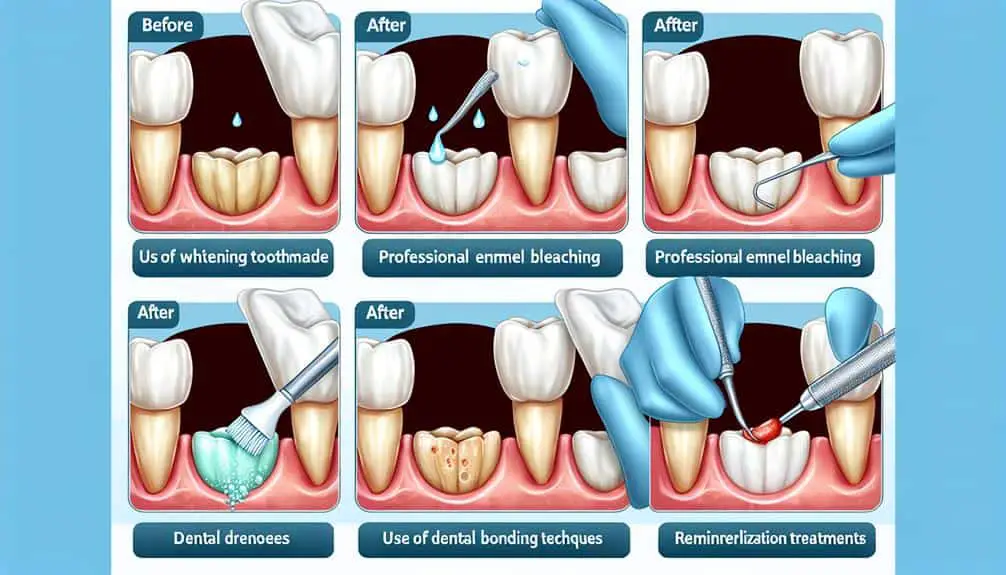To safely whiten your sensitive teeth, opt for desensitizing toothpaste with potassium nitrate or strontium chloride and consider at-home whitening kits with lower bleach concentrations. Protect your enamel by consulting with your dentist before whitening, following product guidelines, and using remineralizing toothpaste or fluoride mouthwash. Incorporating natural remedies like aloe vera rinses and chamomile tea mouthwash can also aid enamel care. Alongside these options, remember to use fluoride toothpaste, avoid acidic foods, attend regular dental check-ups, and keep hydrated for top-notch enamel health and brightness.
Key Points
- Use desensitizing toothpaste with potassium nitrate.
- Consult with a dentist before starting whitening procedures.
- Opt for professional whitening treatments for sensitive teeth.
- Follow instructions carefully with at-home whitening kits.
- Consider using remineralizing toothpaste or fluoride mouthwash for added protection.
Causes of Enamel Sensitivity
Enamel sensitivity can be caused by a variety of factors, including acidic foods and beverages, tooth decay, and overbrushing. Enamel erosion, which is the wearing away of the outer layer of the teeth, can lead to tooth sensitivity. Consuming foods high in acidity, such as citrus fruits and soda, can contribute to enamel erosion over time. Tooth decay, if left untreated, can also cause enamel to wear down, exposing the sensitive inner layers of the teeth. Additionally, overbrushing or using a toothbrush with hard bristles can lead to enamel abrasion, making the teeth more prone to sensitivity.
To prevent enamel sensitivity, it's essential to maintain good oral hygiene practices and to be mindful of the types of foods and beverages consumed. Using a soft-bristled toothbrush and gentle brushing techniques can help protect the enamel from unnecessary wear. Regular dental check-ups can also detect early signs of enamel erosion or tooth decay, allowing for timely intervention to prevent further sensitivity issues.
Best Whitening Options for Sensitivity
For individuals with sensitive teeth seeking effective whitening options, contemplating desensitizing toothpaste formulations can be a beneficial choice. These toothpaste products are designed to be gentle on sensitive enamel while still effectively removing surface stains. Look for desensitizing toothpaste that contains potassium nitrate or strontium chloride, as these ingredients help to alleviate sensitivity while whitening your teeth.
Another option to explore is at-home whitening kits specifically formulated for sensitive teeth. These kits typically come with a lower concentration of bleaching agents to minimize sensitivity while still providing noticeable results. Always follow the instructions carefully and avoid overusing these products to prevent enamel damage.
When exploring whitening options for sensitive teeth, incorporating protective measures is crucial. This includes using a soft-bristled toothbrush to prevent further enamel wear and avoiding acidic foods and beverages that can worsen sensitivity. Prioritize the health of your enamel by opting for gentle products and maintaining good oral hygiene practices.
Steps to Protect Enamel While Whitening
To protect your enamel during the whitening process, it's vital to implement protective measures that promote enamel health and minimize sensitivity. Proper enamel protection and whitening precautions are essential for maintaining a healthy smile. Here are some steps you can take to shield your enamel while whitening:
- Use a desensitizing toothpaste containing potassium nitrate to help reduce sensitivity during whitening treatments.
- Consult with your dentist before beginning any whitening procedure to make certain it's safe for your enamel and overall oral health.
- Opt for professional whitening treatments supervised by a dental professional to minimize the risk of enamel damage.
- Follow the guidelines provided with at-home whitening kits carefully to prevent overuse and potential enamel erosion.
- Consider using remineralizing toothpaste or fluoride mouthwash to strengthen enamel after whitening sessions and reduce sensitivity.
Natural Remedies for Sensitive Teeth
Consider incorporating natural remedies into your oral care routine to help alleviate sensitivity in your teeth. Herbal remedies like rinsing with aloe vera juice can soothe inflamed gums and reduce tooth sensitivity. Aloe vera's anti-inflammatory properties can provide relief when used as a mouthwash.
Another herbal option is chamomile tea, which has anti-inflammatory and antioxidant properties that may help calm sensitive teeth. Simply brew the tea, let it cool, and use it as a mouthwash to potentially reduce discomfort.
DIY treatments can also aid in managing tooth sensitivity. Oil pulling with coconut oil, known for its antimicrobial properties, can help maintain oral health and potentially reduce sensitivity. Mix a teaspoon of salt in warm water and use it as a gentle mouthwash to alleviate sensitivity.
Additionally, a paste made from a mixture of baking soda and water can be applied to the teeth for a short time before rinsing to help neutralize acids and reduce sensitivity. Incorporating these natural remedies into your routine may offer relief for sensitive teeth.
Professional Advice for Enamel Care
Incorporate advice from dental professionals to effectively care for your enamel and maintain peak oral health. Enamel strengthening is vital in protecting your teeth from damage and decay. Here are some dentist recommendations to help you maintain strong and healthy enamel:
- Use fluoride toothpaste: Dentists recommend using fluoride toothpaste to strengthen enamel and prevent cavities.
- Limit sugary and acidic foods: Cutting down on sugary and acidic foods can help protect your enamel from erosion.
- Regular dental check-ups: Dentists advise visiting them regularly for check-ups and professional cleanings to keep enamel healthy.
- Avoid teeth grinding: Dentists suggest wearing a mouthguard at night if you grind your teeth to prevent enamel wear.
- Stay hydrated: Drinking plenty of water helps maintain saliva production, which is essential for enamel remineralization.
Frequently Asked Questions
Can Enamel Sensitivity Be Reversed or Cured Completely?
Enamel sensitivity can be managed and improved through enamel restoration methods and sensitivity prevention techniques. By practicing proper dental care and using products designed for enamel protection, you can reduce sensitivity and enhance oral health.
Are There Any Specific Foods or Drinks That Should Be Avoided to Prevent Enamel Sensitivity?
To prevent enamel sensitivity, avoid acidic beverages like sodas and citrus juices. These can contribute to enamel erosion, leading to tooth sensitivity. Opt for water or milk instead and incorporate dietary tips rich in calcium for enamel protection.
Can Sensitivity to Whitening Treatments Be Reduced Over Time With Consistent Use?
To manage sensitivity to whitening treatments, consistent use can reduce discomfort over time. Long-term effects include improved whitening results and enhanced enamel protection. With regular application, you may experience less sensitivity and better outcomes.
How Long Should I Wait Before Consuming Hot or Cold Foods/Drinks After Whitening Treatment?
After whitening treatment, waiting to enjoy hot or cold foods/drinks is essential. Give your teeth a break for at least 24 hours to prevent temperature sensitivity and protect your enamel. It's worth the wait!
Are There Any Specific Toothpaste or Mouthwash Products That Are Recommended for Those With Sensitive Teeth?
For tooth sensitivity and enamel protection, consider toothpaste and mouthwash formulated for sensitive teeth. Look for products with potassium nitrate or stannous fluoride. These ingredients can help alleviate sensitivity and strengthen enamel for overall oral health.



